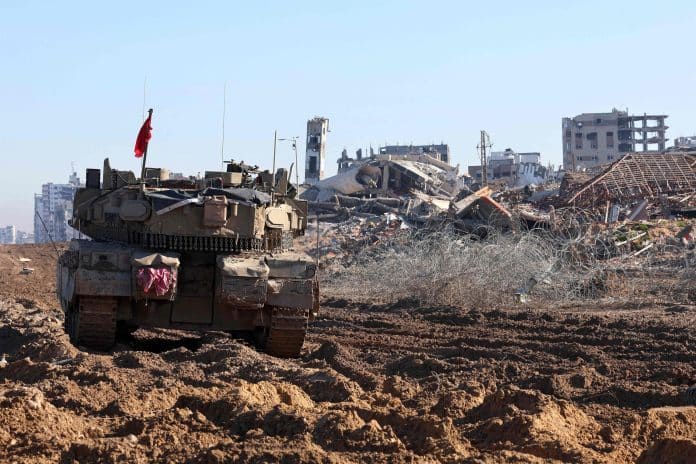Any Israeli ground offensive in Rafah on the Gaza border will “blow up” the hostage exchange negotiations, Hamas-run Aqsa Television channel quoted a senior Hamas leader as saying.
Earlier in the week, Israeli Prime Minister Benjamin Netanyahu said he had ordered the military to develop a dual plan to evacuate civilians from Rafah in southern Gaza and to defeat the remaining Hamas battalions. This move has led to criticism, including from the UN.
“We’re extremely worried about the fate of civilians in Rafah,” UN spokesman Stephane Dujarric said on Friday.
“What is clear is that people need to be protected, but we also do not want to see any forced displacement – forced mass displacement – of people, which is by definition against their will. We would not support in any way forced displacement, which goes against international law.”
‘Tunnel network’
The Israeli military has claimed that its forces have discovered a tunnel network hundreds of meters long and running partly under UNRWA’s Gaza headquarters.
Army engineers took reporters from foreign news outlets through the passages at a time when UNRWA has launched an internal probe and seen a string of donor countries freeze funding over allegations last month by Israel that some of its staff doubled as Hamas operatives.
The Palestinians have accused Israel of falsifying information to tarnish UNRWA, which employs 13,000 people in the Gaza Strip and has been a lifeline for the aid-dependent population for years. The agency runs schools, primary healthcare clinics and other social services, and distributes aid, describing its activities as purely humanitarian.
“Everything is conducted from here. All the energy for the tunnels, which you walked through them are powered from here,” said the lieutenant-colonel during the tour of the tunnels. “This is one of the central commands of the intelligence. This place is one of the Hamas intelligence units, where they commanded most of the combat.”
READ MORE
Türkiye earthquake: One year on
Why a Chinese dragon isn’t a dragon
‘Final victory’ the only solution for peace: Netanyahu
Iran and U.S. ‘exchanging messages’
Iran and the U.S. have exchanged messages throughout the Israel Gaza conflict, including conversations about Lebanese armed group Hezbollah, Iran’s foreign minister said.
“During this war and in the recent weeks, there was an exchange of messages between Iran and America,” Hossein Amirabdollahian said during a visit to Beirut.
He added that the U.S had asked Tehran to request Hezbollah, which is backed by Iran, “not to get widely, fully involved in this war against” Israel.
Amirabdollahian also warned Israel against taking any steps towards a broader war against Lebanon, saying that would be Israeli PM Netanyahu’s “last day.”
“Iran and Lebanon confirm that war is not the solution, and that we absolutely never sought to expand it,” he added.
Amirabdollahian met on Saturday with Lebanon’s caretaker prime minister, foreign minister, speaker of parliament and Hezbollah head Sayyed Hassan Nasrallah.
Hamas operatives killed
The Israeli air force killed two Hamas operatives in Rafah on Saturday, the country’s military said.
One of the targets had been responsible for security for Hamas leaders and the other served in a senior investigator for the governing Islamist group, a military statement said. It added that a third, Rafah-based investigator was also killed.
Middle East economies lagging – IMF
The International Monetary Fund said that Middle East economies were lagging below growth projections due to oil production cuts and the Israel-Gaza conflict, even as the global economic outlook remained resilient.
Despite uncertainties, “the global economy has been surprisingly resilient,” said IMF managing director Kristalina Georgieva, while warning of a potential wider impact on regional economies of continued conflict in Gaza.
In a regional economic report last month, the IMF revised its GDP growth forecast for the Middle East and North Africa down to 2.9 percent this year, lagging below October projections, due in part to short term oil production cuts and the conflict in Gaza.
Georgieva said economies neighboring Israel and the Palestinian territories saw the conflict weighing on tourism revenues, while Red Sea attacks weighed on freight costs globally.
Those factors compounded “the challenges of economies that are still recovering from previous shocks,” she told a forum on the sidelines of the World Governments Summit in Dubai.













